基础英语写作考试用英语写作修辞手法
- 格式:doc
- 大小:54.50 KB
- 文档页数:10
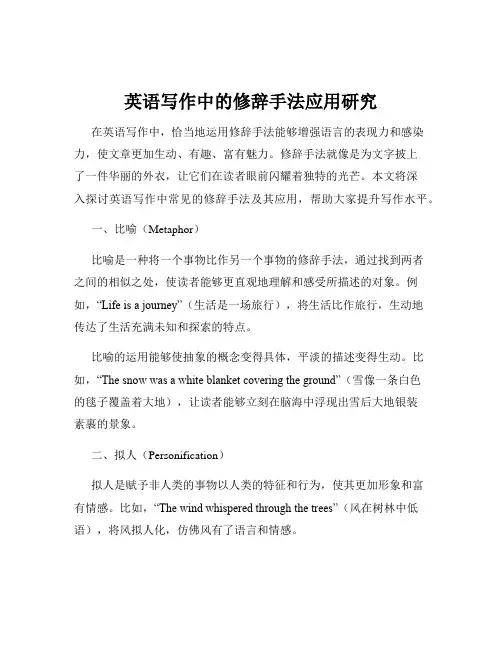
英语写作中的修辞手法应用研究在英语写作中,恰当地运用修辞手法能够增强语言的表现力和感染力,使文章更加生动、有趣、富有魅力。
修辞手法就像是为文字披上了一件华丽的外衣,让它们在读者眼前闪耀着独特的光芒。
本文将深入探讨英语写作中常见的修辞手法及其应用,帮助大家提升写作水平。
一、比喻(Metaphor)比喻是一种将一个事物比作另一个事物的修辞手法,通过找到两者之间的相似之处,使读者能够更直观地理解和感受所描述的对象。
例如,“Life is a journey”(生活是一场旅行),将生活比作旅行,生动地传达了生活充满未知和探索的特点。
比喻的运用能够使抽象的概念变得具体,平淡的描述变得生动。
比如,“The snow was a white blanket covering the ground”(雪像一条白色的毯子覆盖着大地),让读者能够立刻在脑海中浮现出雪后大地银装素裹的景象。
二、拟人(Personification)拟人是赋予非人类的事物以人类的特征和行为,使其更加形象和富有情感。
比如,“The wind whispered through the trees”(风在树林中低语),将风拟人化,仿佛风有了语言和情感。
在英语写作中,拟人可以让读者更容易产生共鸣和情感连接。
例如,“The stars danced playfully in the sky”(星星在天空中欢快地跳舞),使星空显得更加活泼和迷人。
三、夸张(Hyperbole)夸张是故意夸大或缩小事物的特征、程度或数量,以达到强调的效果。
“I'm so hungry I could eat a horse”(我饿得能吃下一匹马),显然一个人不可能吃下一匹马,但通过这种夸张的表达,强烈地传达出了极度饥饿的感觉。
夸张手法能够增强语言的冲击力,使读者对所描述的情况留下深刻的印象。
比如,“His voice was so loud it could shatter glass”(他的声音大得能震碎玻璃),突出了声音的响亮。
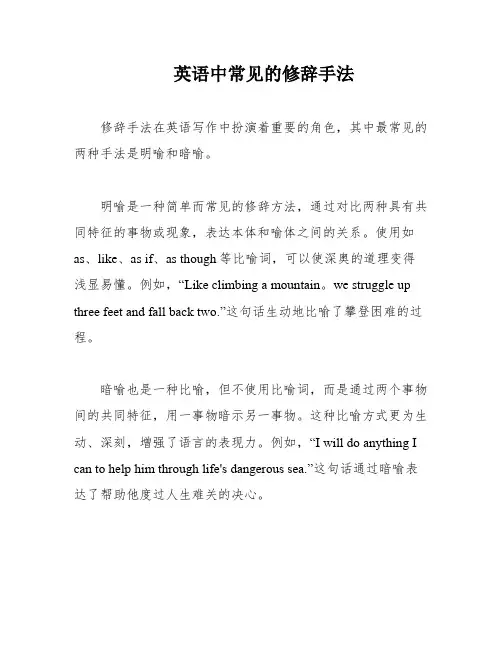
英语中常见的修辞手法修辞手法在英语写作中扮演着重要的角色,其中最常见的两种手法是明喻和暗喻。
明喻是一种简单而常见的修辞方法,通过对比两种具有共同特征的事物或现象,表达本体和喻体之间的关系。
使用如as、like、as if、as though等比喻词,可以使深奥的道理变得浅显易懂。
例如,“Like climbing a mountain。
we struggle up three feet and fall back two.”这句话生动地比喻了攀登困难的过程。
暗喻也是一种比喻,但不使用比喻词,而是通过两个事物间的共同特征,用一事物暗示另一事物。
这种比喻方式更为生动、深刻,增强了语言的表现力。
例如,“I will do anything I can to help him through life's dangerous sea.”这句话通过暗喻表达了帮助他度过人生难关的决心。
修辞手法可以使文章更加生动、形象,让读者更容易理解和记忆。
因此,在写作中灵活使用各种修辞手法,可以提高文章的质量和吸引力。
XXX XXX(将原文稍作改写,去除了夸张用语,更加客观地描述了XXX的作品)XXX。
For example。
on the first day of school。
beautiful XXX(将原文进行了简化和修辞,使句子更加生动有趣)XXX XXX XXX。
XXX(将原文进行了简化和修辞,使用了拟人化手法,使句子更加生动)Irony is the use of words to express the opposite of their literal meaning。
often used for sarcasm。
For example。
"What fine weather for an outing!" can be used to express XXX(将原文进行了简化和修辞,更加准确地描述了反语的用法和效果)头韵是英语中常见的修辞手法,它指的是连续数个单词的头音或头字母相同。
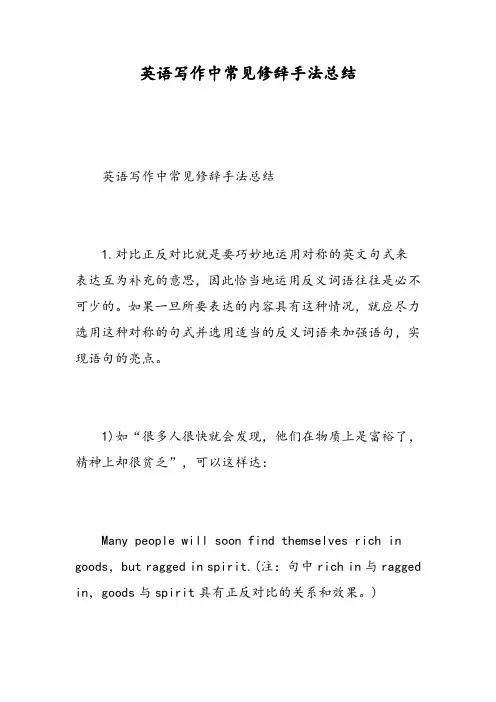
英语写作中常见修辞手法总结英语写作中常见修辞手法总结1.对比正反对比就是要巧妙地运用对称的英文句式来表达互为补充的意思,因此恰当地运用反义词语往往是必不可少的。
如果一旦所要表达的内容具有这种情况,就应尽力选用这种对称的句式并选用适当的反义词语来加强语句,实现语句的亮点。
1)如“很多人很快就会发现,他们在物质上是富裕了,精神上却很贫乏”,可以这样达:Many people will soon find themselves rich in goods,but ragged in spirit.(注:句中rich in与ragged in,goods与spirit具有正反对比的关系和效果。
)2)如“利远远大于弊”,可以这样表达:The advantages for outweigh the disadvantages.(注:句中the advantages与the disadvantages具有正反对比的关系和效果。
)3)如“他们注意到了这些说法中的一些道理,但他们却忽视了一个重要的事实”,可以这样表达:They have noticed a grain of truth in the statements,but have ignored a more important fact.(注:句中have noticed与have ignored,a grain of truth in the statements与a more important fact具有正反对比的关系和效果。
)4)如“这样做既有积极效果也有消极效果”,可以这样表达:It will have both negative and positive effects by so doing.(注:句中negative与positive具有正反对比的关系和效果)5)如“我们既有与我们很为相似的朋友,又有与我们很为不同的朋友”,可以这样表达:We have friends similar to us and friends different from us.(注:句中similar to与different from具有正反对比的关系和效果)2.排比英文中有时也使用排比句式,这种句式整齐而有气势,又不会使人感到单调。
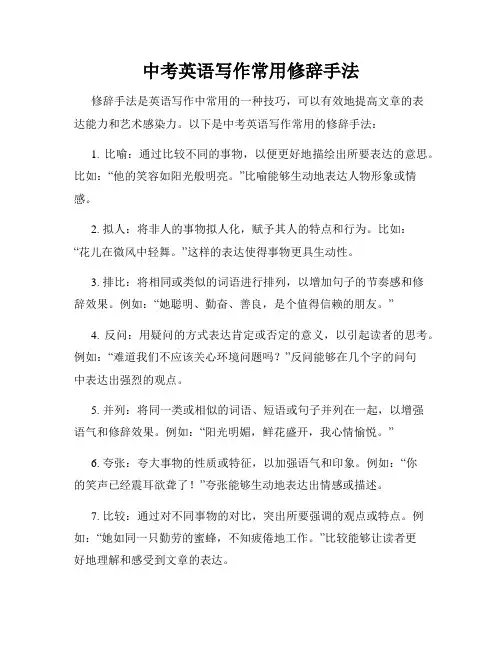
中考英语写作常用修辞手法修辞手法是英语写作中常用的一种技巧,可以有效地提高文章的表达能力和艺术感染力。
以下是中考英语写作常用的修辞手法:1. 比喻:通过比较不同的事物,以便更好地描绘出所要表达的意思。
比如:“他的笑容如阳光般明亮。
”比喻能够生动地表达人物形象或情感。
2. 拟人:将非人的事物拟人化,赋予其人的特点和行为。
比如:“花儿在微风中轻舞。
”这样的表达使得事物更具生动性。
3. 排比:将相同或类似的词语进行排列,以增加句子的节奏感和修辞效果。
例如:“她聪明、勤奋、善良,是个值得信赖的朋友。
”4. 反问:用疑问的方式表达肯定或否定的意义,以引起读者的思考。
例如:“难道我们不应该关心环境问题吗?”反问能够在几个字的问句中表达出强烈的观点。
5. 并列:将同一类或相似的词语、短语或句子并列在一起,以增强语气和修辞效果。
例如:“阳光明媚,鲜花盛开,我心情愉悦。
”6. 夸张:夸大事物的性质或特征,以加强语气和印象。
例如:“你的笑声已经震耳欲聋了!”夸张能够生动地表达出情感或描述。
7. 比较:通过对不同事物的对比,突出所要强调的观点或特点。
例如:“她如同一只勤劳的蜜蜂,不知疲倦地工作。
”比较能够让读者更好地理解和感受到文章的表达。
8. 具体描写:通过丰富的细节和形象的描写,使文章更具真实感和感染力。
例如:“阳光穿透白云,照在湖面上,波光粼粼。
”9. 反讽:用与本意相反的方式表达,以揭示一种矛盾或讽刺。
例如:“你真是个聪明的家伙,连这种简单的问题都不会解答。
”反讽能够增强语气和幽默感。
10. 倒装:将句子中的主语和谓语部分调换顺序,以突出句子中的某个成分。
例如:“In the garden walked a little girl.”倒装能够使句子更加生动和抓人眼球。
这些修辞手法可以使文章更加生动有趣,帮助读者更好地理解和感受作者的意图。
在中考英语写作中,适当使用这些修辞手法能够提升作文的得分和质量。
当然,使用修辞手法要根据作文的题目和主题来判断哪种手法更适合。
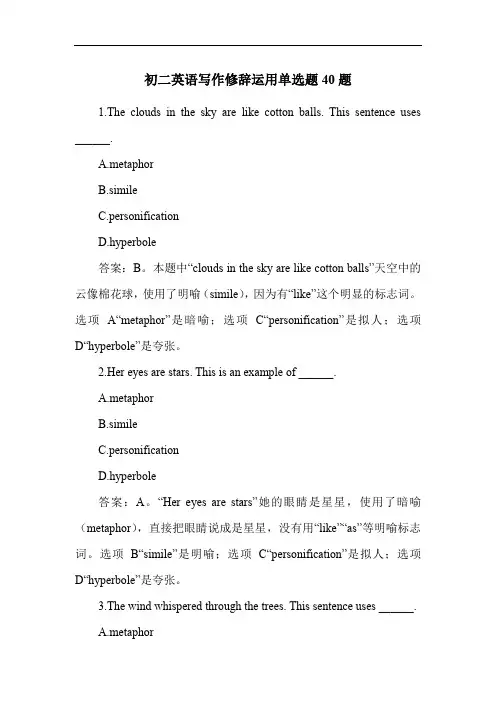
初二英语写作修辞运用单选题40题1.The clouds in the sky are like cotton balls. This sentence uses ______.A.metaphorB.simileC.personificationD.hyperbole答案:B。
本题中“clouds in the sky are like cotton balls”天空中的云像棉花球,使用了明喻(simile),因为有“like”这个明显的标志词。
选项A“metaphor”是暗喻;选项C“personification”是拟人;选项D“hyperbole”是夸张。
2.Her eyes are stars. This is an example of ______.A.metaphorB.simileC.personificationD.hyperbole答案:A。
“Her eyes are stars”她的眼睛是星星,使用了暗喻metaphor),直接把眼睛说成是星星,没有用“like”“as”等明喻标志词。
选项B“simile”是明喻;选项C“personification”是拟人;选项D“hyperbole”是夸张。
3.The wind whispered through the trees. This sentence uses ______.A.metaphorB.simileC.personificationD.hyperbole答案:C。
“The wind whispered through the trees”风在树林中低语,使用了拟人(personification),把风比作人会低语。
选项A“metaphor”是暗喻;选项B“simile”是明喻;选项D“hyperbole”是夸张。
4.He is as strong as an ox. This is a ______.A.metaphorB.simileC.personificationD.hyperbole答案:B。
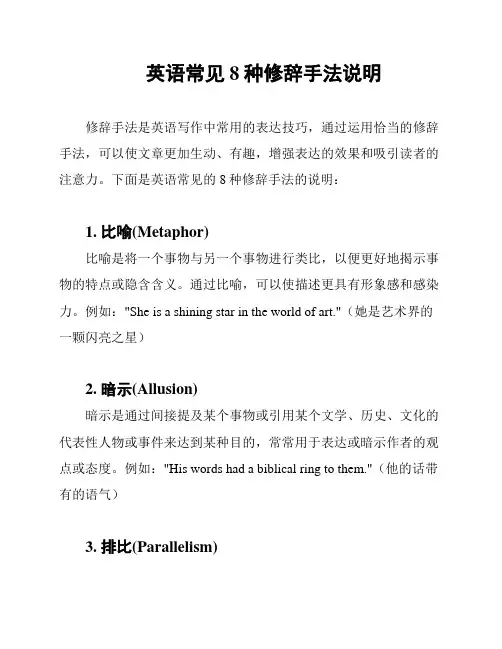
英语常见8种修辞手法说明修辞手法是英语写作中常用的表达技巧,通过运用恰当的修辞手法,可以使文章更加生动、有趣,增强表达的效果和吸引读者的注意力。
下面是英语常见的8种修辞手法的说明:1. 比喻(Metaphor)比喻是将一个事物与另一个事物进行类比,以便更好地揭示事物的特点或隐含含义。
通过比喻,可以使描述更具有形象感和感染力。
例如:"She is a shining star in the world of art."(她是艺术界的一颗闪亮之星)2. 暗示(Allusion)暗示是通过间接提及某个事物或引用某个文学、历史、文化的代表性人物或事件来达到某种目的,常常用于表达或暗示作者的观点或态度。
例如:"His words had a biblical ring to them."(他的话带有的语气)3. 排比(Parallelism)排比是通过重复使用类似的词、短语或句子结构,使文章的句子齐整有序,增强表达的力度和冲击力。
例如:"We came, we saw, we conquered." (我们来了,我们看到了,我们战胜了)4. 反问(Rhetorical Question)反问是在文章或演讲中提出一个问题,但并不期待对方回答,而是用问句来引导读者或听众思考某个问题或强调某个观点。
例如:"Isn't it a beautiful day?"(今天是不是个美好的一天呢?)5. 夸张(Hyperbole)夸张是通过夸大的描述方式来强调某个事物或情感,以达到增强效果的目的。
夸张常用于幽默、夸张或强调的场合。
例如:"I've told you a million times."(我已经告诉过你一百万次了)比较是通过将两个或多个事物进行对比,以突出它们的差异或相似之处,使表达更具有说服力和可信度。
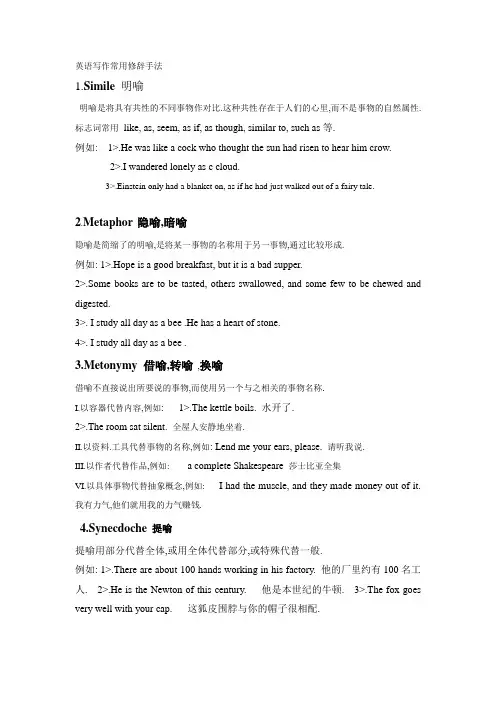
英语写作常用修辞手法1.Simile明喻明喻是将具有共性的不同事物作对比.这种共性存在于人们的心里,而不是事物的自然属性. 标志词常用like, as, seem, as if, as though, similar to, such as等.例如: 1>.He was like a cock who thought the sun had risen to hear him crow.2>.I wandered lonely as c cloud.3>.Einstein only had a blanket on, as if he had just walked out of a fairy tale.2.Metaphor隐喻,暗喻隐喻是简缩了的明喻,是将某一事物的名称用于另一事物,通过比较形成.例如: 1>.Hope is a good breakfast, but it is a bad supper.2>.Some books are to be tasted, others swallowed, and some few to be chewed and digested.3>. I study all day as a bee .He has a heart of stone.4>. I study all day as a bee .3.Metonymy 借喻,转喻,换喻借喻不直接说出所要说的事物,而使用另一个与之相关的事物名称.I.以容器代替内容,例如: 1>.The kettle boils. 水开了.2>.The room sat silent. 全屋人安静地坐着.II.以资料.工具代替事物的名称,例如: Lend me your ears, please. 请听我说.III.以作者代替作品,例如: a complete Shakespeare 莎士比亚全集VI.以具体事物代替抽象概念,例如: I had the muscle, and they made money out of it. 我有力气,他们就用我的力气赚钱.4.Synecdoche提喻提喻用部分代替全体,或用全体代替部分,或特殊代替一般.例如: 1>.There are about 100 hands working in his factory. 他的厂里约有100名工人. 2>.He is the Newton of this century. 他是本世纪的牛顿. 3>.The fox goes very well with your cap. 这狐皮围脖与你的帽子很相配.5.Personification 拟人拟人是把生命赋予无生命的事物.例如: 1>.The night gently lays her hand at our fevered heads.2>.I was very happy and could hear the birds singing in the woods.6.Irony 反语反语指用相反意义的词来表达意思的作文方式.如在指责过失.错误时,用赞同过失的说法,而在表扬时,则近乎责难的说法.例如: 1>.It would be a fine thing indeed not knowing what time it was in the morning. 2>"Of course, you only carry large notes, no small change on you. "the waiter said to the beggar..Allegory讽喻,比方这是一种源于希腊文的修辞法,意为"换个方式的说法".它是一种形象的描述,具有双重性,表层含义与真正意味的是两回事.例如: 1>.Make the hay while the sun shines.2>.It's time to turn plough into sword.7.Hyperbole 夸张overstatement understatement夸张是以言过其实的说法表达强调的目的.它可以加强语势,增加表达效果..例如: 1>.I beg a thousand pardons.2>.Love you. You are the whole world to me, and the moon and the stars.3>.When she heard the bad news, a river of tears poured out.8.Euphemism 委婉,婉辞法婉辞法指用委婉,文雅的方法表达粗恶,避讳的话. 例如:1>.He is out visiting the necessary. 他出去方便一下.2>.His relation with his wife has not been fortunate. 他与妻子关系不融洽.3>.Deng Xiaoping passed away in 19979. 移位修饰transferred epithet将本应该用来修饰某一类名词的修饰语用来修饰另一类名词。
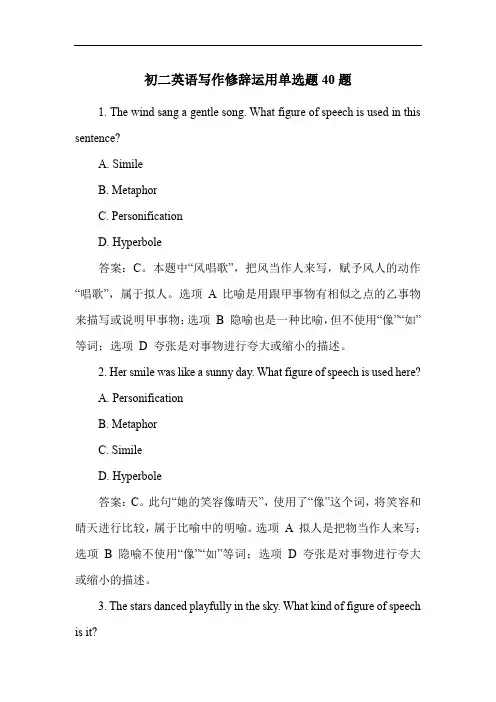
初二英语写作修辞运用单选题40题1. The wind sang a gentle song. What figure of speech is used in this sentence?A. SimileB. MetaphorC. PersonificationD. Hyperbole答案:C。
本题中“风唱歌”,把风当作人来写,赋予风人的动作“唱歌”,属于拟人。
选项A 比喻是用跟甲事物有相似之点的乙事物来描写或说明甲事物;选项B 隐喻也是一种比喻,但不使用“像”“如”等词;选项D 夸张是对事物进行夸大或缩小的描述。
2. Her smile was like a sunny day. What figure of speech is used here?A. PersonificationB. MetaphorC. SimileD. Hyperbole答案:C。
此句“她的笑容像晴天”,使用了“像”这个词,将笑容和晴天进行比较,属于比喻中的明喻。
选项A 拟人是把物当作人来写;选项 B 隐喻不使用“像”“如”等词;选项 D 夸张是对事物进行夸大或缩小的描述。
3. The stars danced playfully in the sky. What kind of figure of speech is it?A. SimileB. PersonificationC. MetaphorD. Hyperbole答案:B。
“星星欢快地跳舞”,把星星赋予人的动作“跳舞”,是拟人手法。
选项A 明喻有明显的比喻词;选项C 隐喻没有比喻词;选项D 夸张不符合此句。
4. His words were a sharp knife cutting through my heart. What figure of speech is employed?A. HyperboleB. PersonificationC. MetaphorD. Simile答案:C。
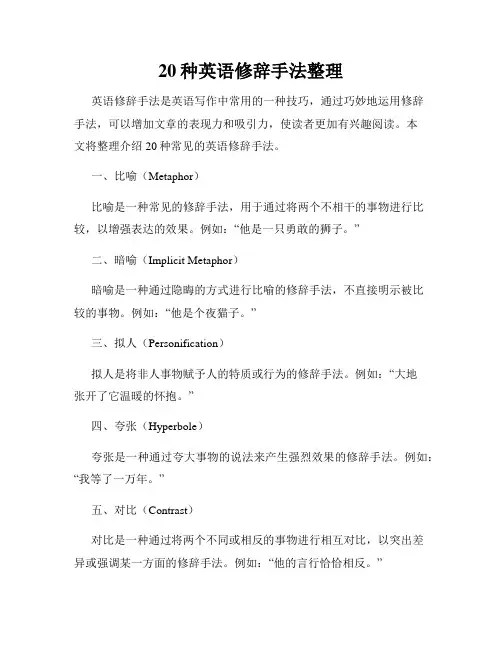
20种英语修辞手法整理英语修辞手法是英语写作中常用的一种技巧,通过巧妙地运用修辞手法,可以增加文章的表现力和吸引力,使读者更加有兴趣阅读。
本文将整理介绍20种常见的英语修辞手法。
一、比喻(Metaphor)比喻是一种常见的修辞手法,用于通过将两个不相干的事物进行比较,以增强表达的效果。
例如:“他是一只勇敢的狮子。
”二、暗喻(Implicit Metaphor)暗喻是一种通过隐晦的方式进行比喻的修辞手法,不直接明示被比较的事物。
例如:“他是个夜猫子。
”三、拟人(Personification)拟人是将非人事物赋予人的特质或行为的修辞手法。
例如:“大地张开了它温暖的怀抱。
”四、夸张(Hyperbole)夸张是一种通过夸大事物的说法来产生强烈效果的修辞手法。
例如:“我等了一万年。
”五、对比(Contrast)对比是一种通过将两个不同或相反的事物进行相互对比,以突出差异或强调某一方面的修辞手法。
例如:“他的言行恰恰相反。
”六、排比(Parallelism)排比是一种通过对句子或短语进行平行结构的修辞手法,以强调重点或增加语句的节奏感。
例如:“奋斗,拼搏,追求,努力。
”七、倒装(Inversion)倒装是一种颠倒语序的修辞手法,常常用于疑问句或为了强调某一部分。
例如:“Never have I seen such a beautiful sunset.”八、反问(Rhetorical Question)反问是一种用疑问句的形式表达肯定或否定的修辞手法,常用于强调某一观点或引起读者思考。
例如:“难道你不想成功吗?”九、比较(Comparison)比较是通过将两个事物进行对比,以凸显共同点或差异的修辞手法。
例如:“学习就像是爬山,充满了艰辛和挑战。
”十、设问(Hypophora)设问是一种在文章中提出问题,并在下文中进行回答的修辞手法,常用于引起读者的关注和思考。
例如:“你知道成功的秘诀是什么吗?答案很简单——努力。
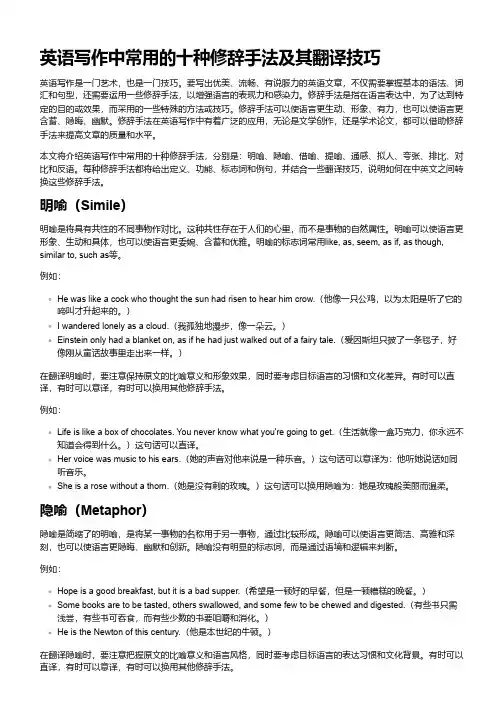
英语写作中常用的十种修辞手法及其翻译技巧英语写作是一门艺术,也是一门技巧。
要写出优美、流畅、有说服力的英语文章,不仅需要掌握基本的语法、词汇和句型,还需要运用一些修辞手法,以增强语言的表现力和感染力。
修辞手法是指在语言表达中,为了达到特定的目的或效果,而采用的一些特殊的方法或技巧。
修辞手法可以使语言更生动、形象、有力,也可以使语言更含蓄、隐晦、幽默。
修辞手法在英语写作中有着广泛的应用,无论是文学创作,还是学术论文,都可以借助修辞手法来提高文章的质量和水平。
本文将介绍英语写作中常用的十种修辞手法,分别是:明喻、隐喻、借喻、提喻、通感、拟人、夸张、排比、对比和反语。
每种修辞手法都将给出定义、功能、标志词和例句,并结合一些翻译技巧,说明如何在中英文之间转换这些修辞手法。
明喻(Simile)明喻是将具有共性的不同事物作对比。
这种共性存在于人们的心里,而不是事物的自然属性。
明喻可以使语言更形象、生动和具体,也可以使语言更委婉、含蓄和优雅。
明喻的标志词常用like, as, seem, as if, as though, similar to, such as等。
例如:He was like a cock who thought the sun had risen to hear him crow.(他像一只公鸡,以为太阳是听了它的啼叫才升起来的。
)I wandered lonely as a cloud.(我孤独地漫步,像一朵云。
)Einstein only had a blanket on, as if he had just walked out of a fairy tale.(爱因斯坦只披了一条毯子,好像刚从童话故事里走出来一样。
)在翻译明喻时,要注意保持原文的比喻意义和形象效果,同时要考虑目标语言的习惯和文化差异。
有时可以直译,有时可以意译,有时可以换用其他修辞手法。
例如:Life is like a box of chocolates. You never know what you're going to get.(生活就像一盒巧克力,你永远不知道会得到什么。
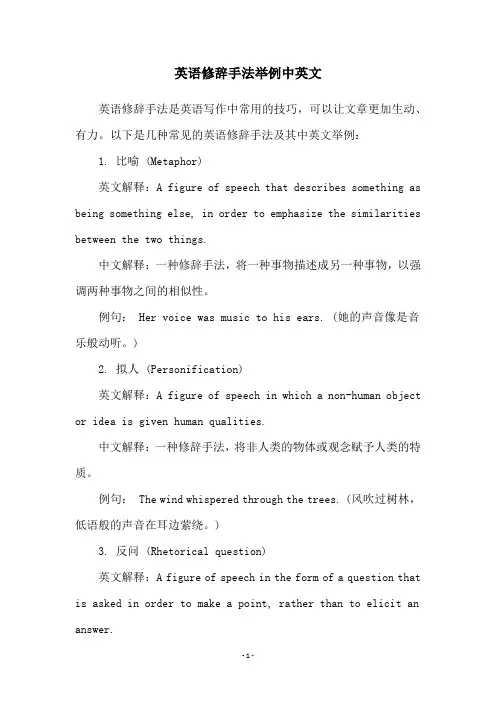
英语修辞手法举例中英文英语修辞手法是英语写作中常用的技巧,可以让文章更加生动、有力。
以下是几种常见的英语修辞手法及其中英文举例:1. 比喻 (Metaphor)英文解释:A figure of speech that describes something as being something else, in order to emphasize the similarities between the two things.中文解释:一种修辞手法,将一种事物描述成另一种事物,以强调两种事物之间的相似性。
例句: Her voice was music to his ears. (她的声音像是音乐般动听。
)2. 拟人 (Personification)英文解释:A figure of speech in which a non-human object or idea is given human qualities.中文解释:一种修辞手法,将非人类的物体或观念赋予人类的特质。
例句: The wind whispered through the trees. (风吹过树林,低语般的声音在耳边萦绕。
)3. 反问 (Rhetorical question)英文解释:A figure of speech in the form of a question that is asked in order to make a point, rather than to elicit an answer.中文解释:一种修辞手法,以问句的形式表达观点,而不是期望得到回答。
例句: Would you jump off a bridge just because your friends did? (你会因为朋友跳桥而跟随吗?)4. 排比 (Parallelism)英文解释:The use of similar grammatical structures, phrases or words to create a rhythmic and balanced effect.中文解释:一种修辞手法,使用相似的语法结构、短语或单词,以创造节奏感和平衡效果。
初二英语写作修辞运用单选题40题1.The girl's eyes are like stars. What figure of speech is used in this sentence?A.Simile(明喻)B.Metaphor(暗喻)C.Personification(拟人)D.Hyperbole(夸张)答案:A。
解析:这句话中“女孩的眼睛像星星”,使用了“like”这个词,是典型的明喻。
选项B 暗喻是直接把甲说成乙,没有使用“like”等词;选项 C 拟人是把物当作人来写;选项 D 夸张是对事物进行夸大或缩小的描述。
2.His words are swords. What figure of speech is used here?A.SimileB.MetaphorC.PersonificationD.Hyperbole答案:B。
解析:“他的话是剑”,直接把话比作剑,是暗喻。
选项 A 明喻要有“like”等词;选项 C 拟人不符合;选项 D 夸张也不符合。
3.The wind whispered through the trees. What figure of speech is this?A.SimileB.MetaphorC.PersonificationD.Hyperbole答案:C。
解析:“风在树间低语”,把风当作人来写,会低语,是拟人。
选项 A 和B 分别是明喻和暗喻,这里没有比喻;选项 D 夸张也不适用。
4.The sun is a golden ball. What figure of speech is employed?A.SimileB.MetaphorC.PersonificationD.Hyperbole答案:B。
解析:“太阳是一个金色的球”,直接把太阳说成球,是暗喻。
选项A 明喻要有“like”等词;选项C 拟人不符合;选项D 夸张也不适用。
5.Her smile is as bright as the sun. What figure of speech is used?A.SimileB.MetaphorC.PersonificationD.Hyperbole答案:A。
运用类比的英语作文引言在学习英语写作时,类比是一种常用的修辞手法。
通过将一个概念或对象与另一个概念或对象进行比较,我们可以更好地理解并表达我们的观点。
本文将介绍如何在英语作文中运用类比,以提高文笔和表达能力。
类比的定义和作用类比是一种修辞手法,通过将两个相似的事物进行比较,以帮助读者更好地理解作者的观点。
通过类比,我们可以将一个抽象的概念或一个陌生的事物与一个已知的事物进行比较,从而使读者能够更容易地理解和接受我们的观点。
类比的作用不仅仅是为了说明问题,它还可以增加文章的趣味性和可读性。
通过合理的类比,读者可以更好地理解作者的观点,并从中获得更多的启发和思考。
如何运用类比选择恰当的类比对象选择恰当的类比对象是使用类比的第一步。
一个好的类比应该具有以下特点:•与要比较的对象有一定的相似性•容易理解的对象,读者能够轻松地与之建立联系•与文章主题相关的对象,能够更好地说明问题清晰地表达类比关系在使用类比时,我们应该清晰地表达类比关系,并确保读者能够理解并接受这个类比。
以下是一些常用的表达类比关系的方式:•“A就像B一样”:通过直接比较两个对象的相似之处来建立类比关系。
•“A可以被比作B”:通过将一个对象比作另一个对象来建立类比关系。
•“A与B类似”:通过指出两个对象之间的相似之处来建立类比关系。
注意类比的局限性虽然类比是一种有用的修辞手法,但我们也应该意识到类比的局限性。
类比只能说明事物之间的相似之处,而不能说明其所有的特点和属性。
因此,在使用类比时,我们应该注意不要过分夸大类比的作用,以免产生误导或误解。
类比的实际应用在描述人物时使用类比通过将一个人物与一个已知的角色进行类比,我们可以更好地描述一个人的特点和个性。
例如,我们可以说某人的勤奋和毅力使他就像一只蜜蜂一样努力工作。
这样的类比可以让读者更好地了解这个人的性格,并对他的行为有更深入的理解。
在解释概念时使用类比有时,一些抽象的概念对于读者来说可能很难理解。
高一英语英语写作修辞手法单选题30题1. In the novel, "The stars danced in the sky." This sentence uses the figure of speech of _____.A. metaphorB. personificationC. simileD. hyperbole答案:B。
本题考查拟人修辞手法。
选项A“metaphor”(隐喻)是用一种事物暗喻另一种事物。
选项C“simile”((明喻)是用“像”“如”等词将两种事物进行比较。
选项D“hyperbole”((夸张)是故意夸大或缩小事物的特征。
而题干中“星星跳舞”,将星星赋予人的动作,是拟人手法,故选B。
2. "The moon is like a big silver plate." This is an example of _____.A. personificationB. metaphorC. simileD. alliteration答案:C。
此题考查明喻修辞手法。
选项 A 拟人是把事物当作人来写。
选项B 隐喻是直接说甲是乙。
选项D“alliteration”((头韵)是指一组词开头的辅音相同。
题干中用“like”表明把月亮比作大银盘,是明喻,所以选C。
3. "The wind whispered through the trees." The figure of speech usedhere is _____.A. metaphorB. personificationC. simileD. irony答案:B。
本题考查拟人手法。
选项A 隐喻是一种隐含的比较。
选项C 明喻有明显的比较词。
选项D“irony”((反讽)是说的话和实际意思相反。
这里“风低语”,将风拟人化,有了人的行为,是拟人,选B。
4. "Her smile was a ray of sunshine." This sentence employs _____.A. personificationB. metaphorC. simileD. pun答案:B。
英语写作的几种修辞手法许多考生反映自己的英语写作要么十分“中文式”,全无英语的味道,要么就是作文干巴巴的显得没有一点文采。
其实英文写作和汉语写作在修辞方面还是存在许多共同之处的。
要使自己的英语作文显得有文采,考生就要在英语写作中尝试采用有效的修辞手法,下面就介绍几种修辞方法:一、比喻(the figures of speech)比喻是语言艺术的升华。
英语中常见的比喻方法有三种:明喻、隐喻和借喻。
1.明喻(the simile)格式:本体+ 显著比喻词(like/as/as if) + 喻体常用介词lik e 、连词as,as if,asso、动词seem等以及句型At o B asCtoD等等表示“好像”意思的比喻说法就叫明喻。
例如:(1) Teacher, you are like the sun, but more magnifi cent, andmore brilla nt. 老师,您像太阳,又比太阳更灿烂更辉煌。
(2) Your soul is as pure as snow, your persona lity is as nobleas pine trees! All praiseto you, our beloved teache r. 您的心灵像雪一样纯净,您的人格像青松一般高洁!赞美您,敬爱的老师。
英语中除上述的用介词、连词或句型等的明喻表达方式外,还有许多常用的明喻习语。
例如:(1)as clear as crystal清如水晶(2)as weak as water 软弱无力这类利用类似汉语的押韵和叠声增加语言的美感。
与此同时,又可以使语言短小精悍,表达生动、形象。
2.隐喻(the metapho r)格式:本体+ is/are + 喻体例如:(1) Time is a river, of which memoryis the water. Oh myfrien d,what I scoop up from the river is all yearnin g ofyou. 时间是河、记忆如水,朋友,我从河里捧起来的都是对你的思念。
英语写作中的修辞手法与修辞技巧修辞手法和修辞技巧是英语写作中常用的方法和技巧,通过运用这些手法和技巧,可以使文章更加生动、有趣、有感染力。
本文将介绍英语写作中常见的修辞手法和修辞技巧,帮助读者提升写作水平。
一、比喻与拟人比喻和拟人是修辞手法中最常见的两种方式之一。
比喻是通过把一个事物与另一个事物进行类比,以达到描绘、说明或打动读者的目的。
比如,“她的笑容如阳光般灿烂”。
在这个例子中,将笑容与阳光进行类比,使描述更加形象生动。
拟人是赋予非生物的事物或抽象概念以人的行为、感受等特征。
例如,“时间在不知不觉中溜走”,将时间拟人化,增加其形象感。
二、排比与对称排比是将相同或相似结构的词语或短语排列在一起,以增加修辞效果。
例如,“勤奋、努力、坚持,是取得成功的关键”。
对称是通过对称的句子结构或词语排列,使文章更加美观和流畅。
例如,“爱情无处不在,它在我们的心里,它在大自然中,它在每一个微笑背后”。
三、反问与夸张反问是提出疑问,实际上并不是要得到回答,而是为了突出问题的重要性或强调某一观点。
例如,“难道我们不能够做出一点贡献吗?”夸张是为了强调某种情感或事物的特点,采用夸张手法,使文章更加生动有趣。
例如,“他笑得那么开心,简直能把整个世界都笑翻了”。
四、反复与对比反复是通过多次提及同一概念或词语,以加强其效果和形象特点。
例如,“他日复一日地工作,愈加疲惫”。
对比是通过对比不同事物的特点或相似点,突出其中的差异或优势。
例如,“她的眼睛像湖水,清澈而宁静,而他的眼睛像暴风雨,狂乱而冷漠”。
五、修辞格与谐音修辞格是一种通过特殊的语言结构和形式,使文句更加有韵律感和节奏感的手法。
例如,“曲径通幽处,绿水青山间”。
谐音是通过运用谐音的词语,使文章幽默有趣。
例如,“听雨声迎春风,一边种菜一边喝酒”。
六、倒装与设问倒装是改变英语句子的主谓语序,通常用于强调句子的某一部分或造成特定的语气。
例如,“Only when we face difficulties can we truly grow”(只有当我们面对困难时,我们才能真正成长)。
英语写作手法英语写作手法主要包括以下内容:1.修辞手法修辞手法是指通过变换语言结构、用词、意义等手段,使语言更具有表现力和感染力的方法。
常见的修辞手法有比喻、拟人、夸张、反问、排比、对仗等。
比喻:用具有相似特点的形象来表现所言事物,增强文章的生动性和形象性。
例如:The classroom was a battlefield.(教室是战场。
)拟人:将无生命的事物拟人化,赋予其人类的特征,使文章生动活泼。
例如:The waves leapt and danced in the breeze.(海浪在微风中起舞跃动。
)夸张:为了突出某种某个特点而把事物描述得过分,以便引起读者的注意。
例如:I've been waiting for you forever.(我等你等了一个世纪。
)反问:用一个问题先否定,再肯定,进而强调某个观点的方法。
例如:Is it not true that we are all afraid of change?(难道我们不都害怕改变吗?)排比:一种将两个或两个以上的事物排列在一起,使文章表达清晰,有节奏感的表现手法。
例如:I came, I saw, I conquered.(我来了,我见过,我征服了。
)对仗:依据语言的二元性或对立性,使有关语言句子的结构、词性、词语、音节,进行错落、对立、呼应。
增强文章语言的美感和表现力。
例如:Man proposes, God disposes.(人作计谋,天定结果。
)2.论证手法论证手法是通过推理、比较、分析等方式,让论点更有说服力,使读者能够相信作者的观点。
常见的论证手法有举例、论据、比较、归纳、演绎、对比等。
举例:通过具体的案例,来证明论点的正确性。
例如:In the past, many dogs had to fight to survive, but now they are pampered and well-cared for.(过去,很多狗必须靠打架才能生存,但现在它们被宠爱和呵护。
•1)As cold water is to a thirsty soul, so is good news from a far country. (Proverbs 25—the Bible)•2)He was like a cock who thought the sun had risen to hear him crow. (George Eliot)•3)He arose joint by joint, as a carpenter’s rule opens, and beat th e dust from his clothes. (The Cop and the Anthem)•4) Della’s beautiful hair fell about her, rippling and shining like a cascade of brown waters.5)The ruby shall be redder than a red rose, and the sapphire shall beas blue as the great sea. (Oscar Wilde)•6)A man without knowledge is like a house without foundation. •7)Air to us is what water is to fish.•8)Reading is to the mind what exercise is to the body.•9)Wisdom is to the mind what health is to the body.•Macbeth) •2)If music be the food of love, play on. (Shakespeare, Twelfth Night) •3)Some books are to be ___, others to be ___, and some few to be ___ and ___. (Francis Bacon, Of Studies)•4)All the world’s a stage,•And all men and women merely players;•They have their exits and entrances,•And one man in his time plays many parts,•His acts being seven ages…•(Shakespeare As You Like It)•5)He was strangled in the net of gossip.•6)His life became a whirlwind of design meetings, client conferences, and last-minute decisions.The Use of Simile and MetaphorTry to be idiomaticspend money like wateras American as apple pieas strong as a horsework like horsesas stupid as a gooseas dry as sawdust(wet) like a drowned rata black sheepfish in the air••2)The wind whistled through the trees.•The wind was moaning through the trees.•3)If not always in a hot mood to smash, the sea is always stealthily ready for a drowning. (Joseph Conrad)•4)The sky rejoices in the morning’s birth. (Wordsworth Resolution and Independence)•Examples made by some students:•5)The rose blushes in the morning breeze.•6)The leaves are trembling in the wind.•7)Please water the thirsty flowers.•8)Look at the smiling moon. How bright it is!•Metonymy is a figure of speech which involves the substitution of the name of one thing for that of another. In other words, it involves a “change of name”; the substituted name suggest s the thing meant. •1)He must have been spoiled from the cradle.•2)You can get a good cup at Black’s café.•3)The whole town went out to welcome him.•4) Sword and cross in hand, the European conquerors fell upon the continent of America.•5)The pen is mightier than the sword.•Grey hair should be respected.•We are reading Dickens/listening to Beethoven.•I very much like to buy an iPhone, only my purse does not allow me that luxury.•6>He was on the bottle for 5 years.•hit the bottle•7>Her heart ruled her head.•8>Whitehall refused to confirm the reports.•9>the Pentagon•10>Oval Office; (Capitol) Hill; Madison Avenue; Fleet Street•The soldiers swore to fight for the hearth and the altar.Unchecked violence has already dulled the luster of the Big Apple. The daunting task before its leaders is to prevent it from rotting to the core. •bar•Reasons for its wide use•Synecdoche involves the substitution of the part for the whole, or the whole for the part. Some experts also use synecdoche to refer to the substitution between the abstract and the concrete.•The part for the whole•1)They counted 50 sails in the harbor.•2)He paid the workers $5 per head.•3)Yet there were some stout hearts who attempted resistance. (Ceril Scott Forester)They seek office, not to be useful to the state, but for the loaves and fishes.•The whole for the part; the material for the thing made•1)The birds sang to welcome the smiling year.•2)The doctor cut me open and took out the appendix.•3)She was dressed in silks.•4)Cotton suits you.•The abstract for the concrete•All the rank came out to see the sight.•The concrete for the abstract•She allowed the mother to be overruled by the judge and declared her own son guilty.•He has a smooth/ silver / evil/ rough/ sharp/ acid/ civil/ glib/ bitter/ bad/ wicked/ long/ oily tongue.•have/ be a big mouth• a crude-mouthed guy•sweet tooth••2)For she was beautiful—her beauty made the bright world dim,… (Percy Bysshe Shelley: The Witch of Atlas)•3)Hamlet: I loved Ophelia: forty thousand brothers could not, with all their quality of love, make up my sum.•4)You always make the same mistake. I have warned you 1000 times. •5)It’s ages since we met last time.•6)No book in the world is more difficult than this linguistic book. Reading it is absolute torture.•7)After TEM4, I could sleep for a year.•8)From his mouth flowed speech sweeter than honey.•9)I beg a thousand pardons.•10)Polly, I love you. You are the whole world to me, and the moon and the stars and the constellations of outer space.•Thanks a million. (v)•Thanks a billion. (x)••Litotes is understatement by the use of negatives.•1)The face wasn’t a bad one; it had what they called charm. (John Galsworthy)•2)That was no mean achievement.•3)But to Darwin this was no light/ no laughing matter.•4)I know he is no fool.•5)I lost not a little over cards.•6)This piece of work is nothing to be proud of.•Meiosis is understatement without the use of negatives. Instead, it uses expressions like a little, a bit, kind of, sort of, almost, hardly, scarcely, etc.•1)The little boy broke a vase and was a little upset.•2)The girl is a bit slow for her age.•3)He was a little too previous in making the decision.•mean on the surface.•1)This hard-working boy seldom reads over an hour every week. •2)It must be delightful to find oneself in a foreign country without a penny in one’s pocket.•3)Robbing an old widow of her money was certainly a noble act. •4)The child picked up the spectacles and put them on. “Now you look as wise as an owl,” said his father affectionately.••by the joining of 2 contrasting or contradictory terms.•1)The government’s response to the report has been a deafening silence.•2)Barbara --- who declines interviews but is said to have loved the Barbie doll --- may be the most famous unknown figure on the planet. •3)The Poverty of Affluence: Choosing Our Success•---When Robert Reich noticed that work was costing him his personal life, he stepped down as U. S. Secretary of Labor to reflect on what “success” really means.•Different forms of oxymoron:•1)adj.+n. careful carelessness, orderly chaos,•tearful joy, honest thief, sweet torment/pain, thunderous silence, jarring concord, proud humility, luxurious poverty, noble lie, cold welcome, a generous miser, an enlightened despot•2)adj.+adj. cold pleasant manner, poor rich guys, bitter-sweet memories, bad good news•3)ad.+adj. mercifully fatal, falsely true,•splendidly alone, disagreeably pleasant laugh•4)v.+ad. hasten slowly, shine darkly, groan loudly•5)n.+n. a love-hate relationship••one considered harsh or indelicate.•stupid/mentally retarded:•He is a bit slow for his age.slow; simple; simple-minded; innocent; naive; not all there;empty-headed; one’s thick head; dull; dumb; all thumbs; underachiever•poor/penniless:•(be) hard up; in reduced circumstances; badly off; in a (bad) spot;financially challenged; the havenots; the needy; underprivileged; deprived; disadvantaged; feel the pinch•old age•old age: getting on (in years); past one’s prime; feeling one’s age; be advanced in years; an advanced age; second childhood; the veterans; elderly; golden ager; experienced; hardened; seasoned; weathered •“I respect John McCain for his half-century of service to this country. But he is on the wrong side of history right now.”•dismiss/discharge/fire•lay off; release; give/get the walking ticket; give/get the sack; sack; downsize; get a pink slip; idle; redundancy•General Electric is ready to idle 75000 according to Business Week Online. (Time, 2001)•I regret having to make so many staff redundant.•in debt: in difficultiesdole: relief; welfare; benefit(s); entitlement•death penalty: capital punishment•lie: tell a fairy story/ tale•grave (noun)•We have come to dedicate a portion of that field as a final resting place for those who here gave their lives that that nation might live. (Abraham Lincoln, The Gettysburg Address)•The functions of euphemism•This device is extremely popular with both poets and writers. In this device the same consonant sound is repeated at intervals in the initial position of words.• A. a feature of tongue-twisters•She sells sea-shells on the seashore.• A big bowl was broken by Barbara.•Round the rocks runs a river.•Down the drive dashed dashing Dan.•Peter Piper picked a peck of pickled pepper prepared by his parents and put them in a big paper plate.• B. a rhetorical device in literature•1)And sings a solitary song,•That whistles in the wind. (Wordsworth)•2)Freedom is not given free to any who ask, liberty is not born of the Gods. She is a child of the people, born in the very height and heat of battle… (F. Norris)• C. in proverbial and idiomatic expressionswax and wane; think thrice and then act, look before you leap; now or never; in weal and woe; better safe than sorry; go to rack and ruin; bolt from the blue; give the devil his due; beat the band; burn one' s boat/bridges; carry coals to NewcastleWaste not, want not.Practise what you preach.Bite the bullet! The darkest hour is the nearest dawn. I bet you’ll soon turn the tables.Sir, there is no royal road to learning.An empty sack cannot stand upright.•Proverbial and idiomatic expressions.•8) as bare as the back; as large as life; as blind as a bat; (as) bold as brass; (as) brisk as a bee; as brown as a berry; as busy as a bee; as clear as crystal; as close as a clam; (as) cool as a cucumber; as different as chalk from/ and cheese; (as) fit as a fiddle; as good as gold; as green as grass; as hungry as a hawk/ hunter; as plain as print; as pretty as picture; as proud as a peacock; as red as a rose; as right as rain; as slow as a snail; as still as a statue; as thick as thieves; as weak as water; (as) bright as a button• D. in ads and journalistic writings•1)(Titles of articles): Bye, Bye, Balanced Budget•2) For comfort, convenience, superb service and more flights to Japan—YOU CAN DEPEND ON US. Cathay Pacific•3) Over the years, Korea’s relationships with America have long seesawed between peace and peril. (The Times)•Application•She’s determined to win, by fair means or foul.•by hook or by crook•You shall judge a man by his foes as well as by his friends.(Joseph Conrad)•Above all, from trivial things to life philosophy, friends indisputably play an important role in influencing young adults. So it is critical for young adults to find true friends who will stand by them rain or shine. ___0402 邵艳萍•writer thinks are familiar to his readers.•Chief sources of English allusion: nursery rhymes, fairy tales, folk tales, legends, Greek and Roman mythology, Bible stories, parables, and the works of great writers•The House of the Seven Gables(Nathaniel Hawthorne) •Absalom, Absalom! (William Faulkner)•That expectation could prove the Achilles’ heel of the project.(The Economist)•I learned a great many new words that day. I do not remember what they all were; but I do know that mother, father, sister, teacher were among them --- words that were to make the world blossom for me, “like Aaron's rod, with flowers.” (Helen Keller, The Most Important Day• A transferred epithet is, as its name implies, a figure of speech where an adjective or descriptive phrase is transferred from the noun it should rightly modify to another which it does not really belong to. •Roosevelt listened with bright-eyed smiling attention.•Point out the transferred epithets in the following sentences.Though Hilary Clinton was frequently dogged by troubles for years, she always puts on a brave face in public.•She has very expensive taste(s) in clothes.•Hans shrugged his scornful shoulders.Throughout his trial he maintained a dignified silence.•He is not an easy poet.•Application•It was the end of my exhausting first day as tutor.•(0304 Yu Cui) Tears quietly rolled down my cold face, only to leave two sad trails.•When I was in difficulties, she gave me an assuring /a reassuring hand.•Try to interpret the following expressions which consist of transferred epithet.•purposeless days; a murderous knife; angry fist; an understanding smile; a sympathetic look; nervous hours; sleepless/ restless nights; cold shoulder; a sleepless bed•transferred epithet: association of contiguity•personification/metaphor/simile: association of similarity •metonymy/synecdoche: association of relatednesssynesthesia vs. transferred epithetTransference/empathy vs. transferred epithet。